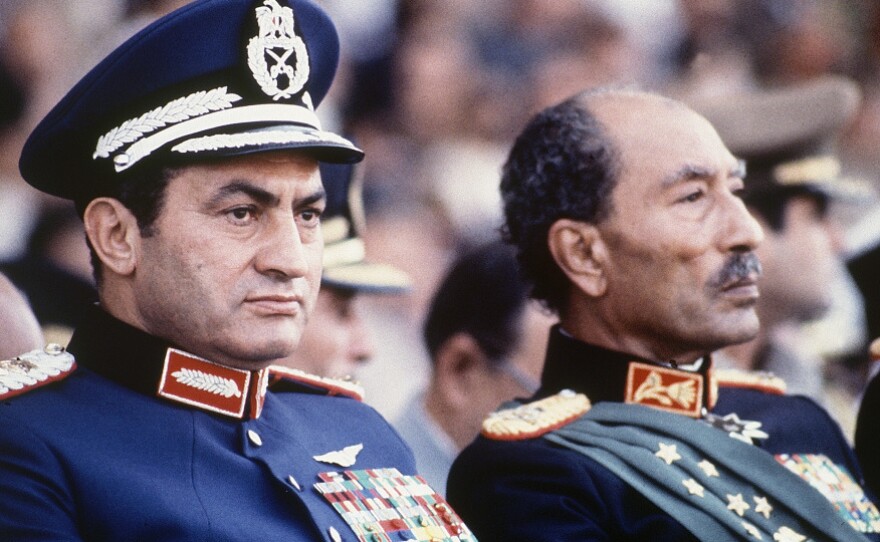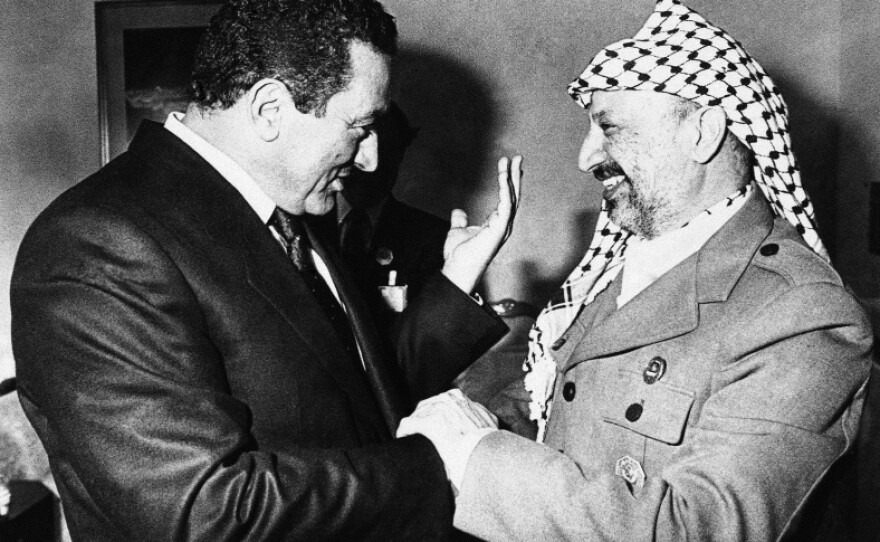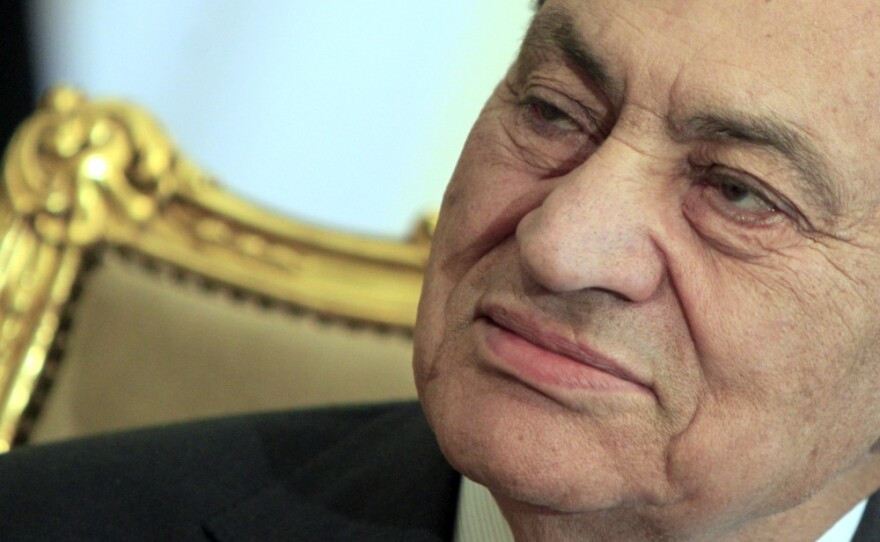After weeks of mass anti-government protests, Hosni Mubarak resigned as Egypt's president Friday. During his three decades in power, he was known around the world as an Arab leader who maintained peaceful relations with Israel and close ties to the U.S. through often difficult times. But for the protesters who have kept vigil in Cairo's Tahrir Square, Mubarak was considered a repressive dictator.
Mubarak was Egypt's longest-serving leader since the 19th century, and for many Egyptians, his reign was most notable for what it was not. Mubarak was not an ambitious Arab nationalist like Gamal Abdel Nasser. He was not a risk-taking statesman like Anwar Sadat, who surprised Egyptians by plucking Mubarak from the ranks of the Egyptian military to be his vice president in 1975.

The burly air force pilot from a small village in the Nile Delta seemed uninspiring next to Sadat, who stunned the Arab world by not only visiting Jerusalem but also signing a historic peace accord with Israel. As it happened, Sadat's boldness only reinforced Mubarak's natural caution, especially after the blood-soaked tragedy that elevated him to the presidency on Oct. 6, 1981.
Islamist assassins, enraged by Sadat's recognition of the Jewish state, gunned down the president before Mubarak's eyes as the two men watched a military parade.
From 'Compassionate' To 'Very, Very Bad'
Mubarak, who was wounded in the attack, took away a number of lessons from his predecessor's demise. He made security an absolute priority, arresting and imprisoning Islamists and their supporters across the country.
Analyst Diaa Rashwan said so much time has passed that it's hard to remember how reassuring it was to see this sturdy military man take control of a country traumatized by Sadat's assassination and fearful of an Islamist coup.
"When Hosni Mubarak came, he came under very difficult conditions. A president was assassinated, and he succeeded to have his legitimacy from mainly the Egyptian establishment, from the Egyptian Army, and also from his first measures," Rashwan said.
Ordinary Egyptians embraced Mubarak as one of their own. And while he continued to jail Islamists, he released some of the more secular political prisoners arrested by Sadat. Mubarak also cracked down to some extent on corruption within the government and spoke of political reform, promising to serve only two six-year terms.
But Mubarak broke that promise when he ran for a third term in 1993. Six years later, after surviving an assassination attempt and waging a brutal campaign against violent Islamist factions, he won a fourth term.
Journalist Mohammed Sayyed el-Said, who died in 2009, said in a 2008 interview that he gave Mubarak credit for quelling Islamist uprisings and averting total economic collapse in Egypt. But he said the cost in terms of democratic reform and human rights was high.
"His first tenure in office was more or less compassionate, but the situation got very, very bad and increasingly worse since 1986," he said. "Dramatic and massive abuses of human rights characterize his regime, and caused the country a great toll in terms of human rights."
A New Rallying Cry: 'Enough'
In 2005, feeling pressured by demonstrators at home and by the Bush administration's pre-emptive and activist foreign policy moves, Mubarak announced that Egypt's constitution would be amended to allow for the country's first multicandidate presidential election.
Suddenly, the demonstrations took on a new tone, as protesters campaigned explicitly against Mubarak for the first time, shouting "kifaya," the Arabic word for "enough."
With a slick and expensive political campaign organized by his younger son, Gamal — who was rising quickly through the political ranks — the 77-year-old Mubarak announced in July 2005 that he would seek a fifth term in office.

"I would never, ever let Egypt down, and for their sake, I announce that I am determined to be nominating myself in the coming presidential elections," he told the country, according to a translator.
Despite the early promise of more openness, observers said the election was marred by widespread irregularities and intimidation. Mubarak cruised to an easy victory, making promises of economic and social reform in villages around the country.
Yet Said, the journalist, said by that point Egyptians knew better than to expect real changes.
"We have rampant corruption. We have a society that is totally alienated. ... The institutional infrastructure of the country is totally fake and imposed from above," he said. "So I would say that — well, unfortunately he was never really a 'philosopher,' but he was not even the kind of wise man that he could have been if he continued the way he started in his first tenure of office."
A Long, Slow Decline
In their desperation, more and more Egyptians began listening to the arguments of the Muslim Brotherhood, which had abandoned the violent rhetoric of its past in favor of an anti-corruption platform. Mubarak's regime responded by arresting thousands of brotherhood supporters, keeping the movement from gaining enough seats in Parliament to affect any real change.
The secular, liberal opposition, meanwhile, was in tatters, and it seemed the most popular jobs for those young Egyptian men who didn't emigrate in search of work were in the security forces.

In a 2008 documentary aired by the Al-Jazeera satellite channel, analyst Osama Harb noted that in a country of 70 million people, there was a policeman for roughly every 40 Egyptians: "850,000 officers and soldiers; 450,000 state security forces; 400,000 secret police. This is a president who is relying on an internal army in addition to the army itself."
In recent years, Mubarak made an effort to re-establish Egypt's role as a regional mediator, especially with regard to the Israeli-Palestinian conflict. His strongest asset in that regard was his longtime intelligence chief, Omar Suleiman, whom he named last month as his first vice president ever.
Meanwhile, those connected to the regime's elite inner circle grew ever richer, and ordinary Egyptians saw decent living standards slip further and further away.
Analyst and author Hugh Roberts, formerly with the International Crisis Group, said he thinks the seeds of the long, slow decline that characterized much of Mubarak's tenure were sown in the chaos and bloodshed of Sadat's murder.
With a glorious past and a depressing present, Egyptians were long forgiven for looking backward. But now the popular myth that Egyptians simply aren't revolutionary by nature has been exploded, and no one knows where this most populous Arab country is headed.
And now that the legendary Egyptian patience and stoicism have run out, this country's enormous problems of economic stagnation and disparity will loom all the more urgently for Egypt's next leaders.
Copyright 2022 NPR. To see more, visit https://www.npr.org. 9(MDAzMjM2NDYzMDEyMzc1Njk5NjAxNzY3OQ001))







